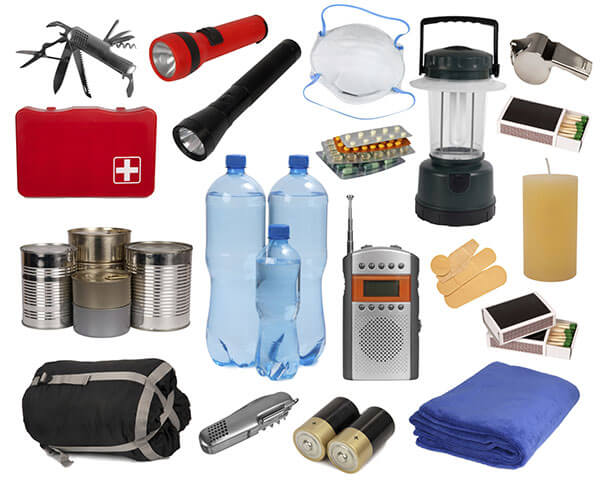
Survival 101: Items for Survival
Have you set aside items for survival in the unlikely event of a natural disaster? It’s important to be prepared for all kinds of emergencies, from a simple power outage to a full-scale incident. With a little advanced planning, you can ensure that you and your family remain comfortable and safe until relief workers are able to restore access to food and water, as well as electrical and gas services. In general, experts recommend that you be self-sufficient for at least three days. Here are some of the key items for survival that you should always strive to have on hand.
- Food and water: One of the most critical items for survival is safe drinking water. Experts recommend you store one gallon per day per person, and more for those who are pregnant or ill. Emergency water filters and purifiers are a good idea as well. Choose foods that require minimal preparation (and water for cooking), and also stay away from salty foods that will induce excess thirst. Don’t forget food and water for your pet also.
- Emergency power/lighting: Of course, an emergency backup generator is ideal but not always practical for every household. But there are other items that can get you through a power outage in relative comfort. Flashlights of all sizes are always good, as are the battery-powered lanterns commonly sold as camping equipment. Don’t forget to include batteries of all sizes in your cache as well (and pay attention to their expiration dates). Candles and matches are a must-have, and you might also want to include charcoal and lighter fluid (or wood if you have a stove in your home), which will give you cooking and heating options.
- Safety items: These survival items are intended to help keep you connected and safe in the case of a life-threatening emergency. At the top of the list here is battery operated radio (with extra batteries), which will help keep you connected to authorities and informed on evacuation orders and general recommendations as they are released. Other important items include a first-aid kit (and manual if you’re not certified), a fire extinguisher (or baking soda), and a roadside kit for your car.
- Personal care/hygiene: When putting aside items for survival, don’t forget about the individual needs of members of your family, particularly if you need to evacuate. Be sure to have on hand any prescriptions and over the counter medications, as well as feminine products and other hygiene items. Toilet paper and Kleenex are always a good idea, as is a plastic bucket for waste and sanitation. Remember to put in diapers and wipes, or any other items your children might need as well.